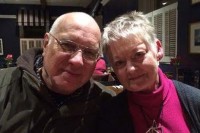If you need an example of local superheros, look no further than Alona and Don Steinke. These two are part of the extremely strong backbone of citizen-led resistance to the mega-oil terminal proposed at the Port of Vancouver and coal export in Washington. Their commitment to fighting climate change and protecting their community is unparalleled and inspirational.
Don taught high school physics, chemistry, biology, earth science and environmental science at one time or another during his 43 years of teaching, mostly in Clark County. He served on the Clark County Clean Water Commission for five years and was a volunteer speaker for the Clark County Endangered Species Program. Alona is a registered nurse, retired, and is concerned about diesel particulates near the tracks and coal dust particularly near terminals. Both cause many serious health problems. Alona spent most of her career working in the Child Care Clinic, and then in dermatology for the Vancouver Clinic.
In 2009, Alona and Don Steinke gave up fighting Climate Change when they saw the tremendous pushback President Obama faced from Congress regarding plans to reduce carbon emissions. They decided to start a small organic farm and sell fruits and vegetables from a farm stand at the end of their driveway. But in 2012, when they learned that the fossil fuel industry was planning to ship 150 million tons of coal per year, and 700,000 barrels of crude oil per day through the Columbia Watershed, crossing hundreds of salmon bearing streams, they realized this is on Our watch. “We had to do everything we could.”
Don and Alona shared their story with us this month…
Through Occupy they discovered and joined many great groups, including Columbia Riverkeeper, that were already challenging these proposals. Alona and Don love and admire the people in all these organizations and recognize that they are all important. But they have decided that Columbia Riverkeeper provides the most bang for the buck and therefore signed up for an automatic monthly donation.
BPA is forecasting that as the planet warms, more winter precipitation in the mountains will fall as rain rather than as snow, causing peak flows to come earlier and summer flow to dwindle. It may be too late to save the Columbia River (as we know it) from the effects of Climate Change, but maybe we can save something. This changing climate will be hard on salmon and on Big Ag in Eastern Oregon and Washington. Much of their food comes from crops in Eastern Washington that depend on late summer snow melt. And many of their jobs at the Port of Vancouver involve exporting those crops.
The oil trains will never be required to travel at speeds below which they rupture during derailments. According to the FRA website, over the last three years, BNSF has averaged two derailments per million train miles over the last three years. By his calculations, there will be 150 derailments of full oil trains somewhere along the route from North Dakota to deep water terminals in Washington and Oregon in the next 15 years, if all the terminals are approved. The cost of the 2010 pipeline spill into the Kalamazoo River continues to climb beyond $950 million. Tar Sands Oil is difficult to clean up from a river because the diluents evaporate and allow the tar to slowly sink. By the time the tar settles on the riverbed it has traveled many miles.
With the help and guidance of Dan Serres of CRK and Laura Stevens of the Sierra Club, Don and Alona organized the passage of a resolution by the City of Vancouver which asked the Governor to deny permits for all projects which would increase oil train traffic in Clark County. Seven hundred people showed up at the city council meeting to testify on June 2, 2014.
“What keeps us going is the optimism we gain as thousands of people join the campaign every year. Altogether, nearly 20,000 people have shown up to testify at public hearings in Washington and Oregon. Part of our job as an environmental community is to give the decision makers the political capital they need to reduce the harm.”
Don and Alona say, “You can help do that today. Governor Inslee and his Department of Ecology are inviting public comment regarding the recommendations of the spill response team. The easiest way to reduce the risk of oil spills is to deny permits for all new oil by rail facilities.” The deadline is December 1. Use this link for submitting a comment.



